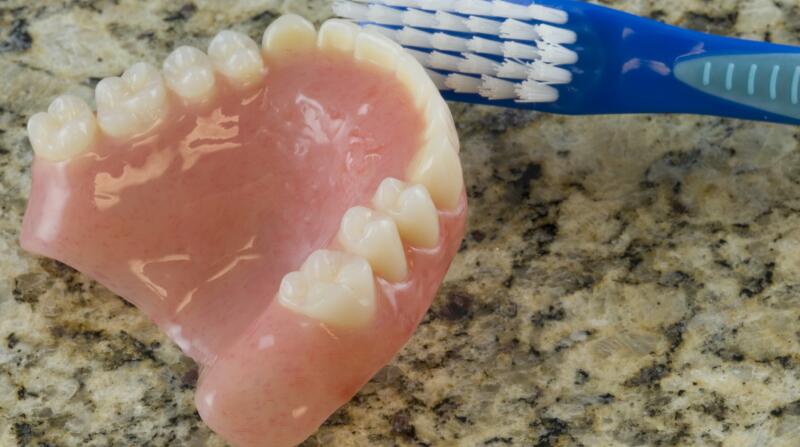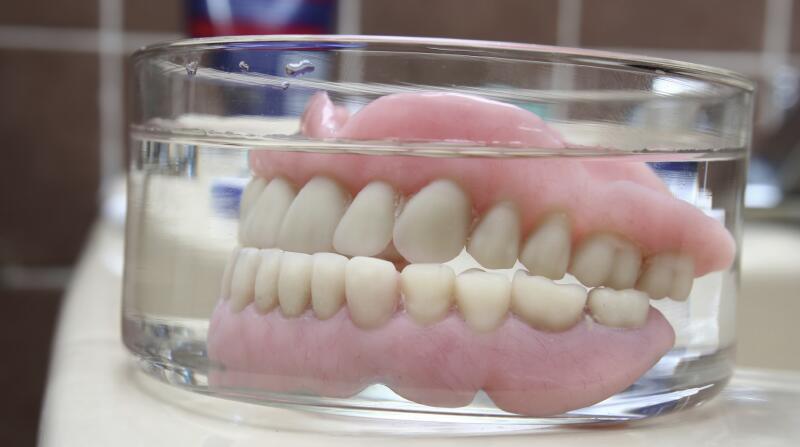9 Tips for Denture Wearers

Medically Reviewed By William C. Lloyd III, MD, FACS
-
 Maintain your smile and health.Dentures can help you maintain a great smile and play a vital role in your health and quality of life. Learning to live with a full or partial set of dentures may seem challenging at times. Speech, chewing, dry mouth, bad breath, and even mouth infections become issues. Some reports say over half of those wearing dentures will develop a fungal infection called oral stomatitis. But there are some tips you can follow to prevent this infection, as well as keep you smiling, eating, and speaking with confidence.
Maintain your smile and health.Dentures can help you maintain a great smile and play a vital role in your health and quality of life. Learning to live with a full or partial set of dentures may seem challenging at times. Speech, chewing, dry mouth, bad breath, and even mouth infections become issues. Some reports say over half of those wearing dentures will develop a fungal infection called oral stomatitis. But there are some tips you can follow to prevent this infection, as well as keep you smiling, eating, and speaking with confidence. -
 Brush your dentures daily.Dentures need to be brushed daily! Like regular teeth, dentures can get stained and develop tartar and bacteria. To help keep your pearly prosthetic whites clean, first rinse them to remove food particles. Then brush with a dampened soft-bristled brush or denture brush using a mild hand soap or dishwashing detergent and warm water. Dental experts say to avoid bleaching agents, which can damage dentures. Scrub gently. If you use denture adhesive, clean the grooves that fit against your gums to remove any remaining adhesive.
Brush your dentures daily.Dentures need to be brushed daily! Like regular teeth, dentures can get stained and develop tartar and bacteria. To help keep your pearly prosthetic whites clean, first rinse them to remove food particles. Then brush with a dampened soft-bristled brush or denture brush using a mild hand soap or dishwashing detergent and warm water. Dental experts say to avoid bleaching agents, which can damage dentures. Scrub gently. If you use denture adhesive, clean the grooves that fit against your gums to remove any remaining adhesive. -
-
 Follow good hygiene habits to keep bad breath and fungal infections away.Reports suggest dentures can be a source of fungal infections in the mouth. Some studies link oral bacteria with certain illnesses in the respiratory tract. That's why it's important to clean your dentures and mouth every day. Remember to brush your gums, mouth, cheeks, and tongue with a soft-bristled brush and toothpaste before putting dentures in each morning. This will help remove plaque and bacteria that could contribute to gum irritation and bad breath.
Follow good hygiene habits to keep bad breath and fungal infections away.Reports suggest dentures can be a source of fungal infections in the mouth. Some studies link oral bacteria with certain illnesses in the respiratory tract. That's why it's important to clean your dentures and mouth every day. Remember to brush your gums, mouth, cheeks, and tongue with a soft-bristled brush and toothpaste before putting dentures in each morning. This will help remove plaque and bacteria that could contribute to gum irritation and bad breath. -
 Soak dentures daily in a denture cleanser.After you brush, dental experts recommend soaking your dentures daily with a nonabrasive denture cleanser to remove food, plaque, and bacteria. An added bonus— soaking dentures in a cleaning solution can also help kill germs that cause bad breath. Check with the manufacturer's suggestion on how long you should soak your dentures. Never use denture cleansers inside your mouth, and be sure to rinse dentures thoroughly before putting them back into your mouth. Different types of denture cleaners are available, including effervescent, gels, and creams.
Soak dentures daily in a denture cleanser.After you brush, dental experts recommend soaking your dentures daily with a nonabrasive denture cleanser to remove food, plaque, and bacteria. An added bonus— soaking dentures in a cleaning solution can also help kill germs that cause bad breath. Check with the manufacturer's suggestion on how long you should soak your dentures. Never use denture cleansers inside your mouth, and be sure to rinse dentures thoroughly before putting them back into your mouth. Different types of denture cleaners are available, including effervescent, gels, and creams. -
 Give your mouth a 6- to 8-hour break.Dental experts recommend taking your dentures out for 6 to 8 hours a day to allow the tissues of your mouth to heal from any soreness or irritation that may have occurred throughout the day. Sleeping without dentures is a good way to give your mouth a rest. Store them in warm—not hot—water or a solution that is approved by your dentist. This helps them keep their shape and prevents them from drying out. When handling your dentures, keep a towel underneath them to prevent them from breaking if they fall.
Give your mouth a 6- to 8-hour break.Dental experts recommend taking your dentures out for 6 to 8 hours a day to allow the tissues of your mouth to heal from any soreness or irritation that may have occurred throughout the day. Sleeping without dentures is a good way to give your mouth a rest. Store them in warm—not hot—water or a solution that is approved by your dentist. This helps them keep their shape and prevents them from drying out. When handling your dentures, keep a towel underneath them to prevent them from breaking if they fall. -
 Ask your dentist about adhesives.It's important that your dentures fit properly in your mouth. Poorly fitting dentures can cause problems like sores and pain. To ensure a better fit, some denture wearers use adhesives. Dental adhesives can help prevent food particles from lodging between dentures and gums. They also help secure your dentures in place while you eat and talk. Use adhesives as directed, as some contain zinc, which excessive or prolonged use of has reportedly been associated with health issues. Consult with your doctor to see if it is appropriate for you to use.
Ask your dentist about adhesives.It's important that your dentures fit properly in your mouth. Poorly fitting dentures can cause problems like sores and pain. To ensure a better fit, some denture wearers use adhesives. Dental adhesives can help prevent food particles from lodging between dentures and gums. They also help secure your dentures in place while you eat and talk. Use adhesives as directed, as some contain zinc, which excessive or prolonged use of has reportedly been associated with health issues. Consult with your doctor to see if it is appropriate for you to use. -
-
 Cut your food in small pieces.It may take an adjustment period to get used to chewing with your new dentures. This can affect your overall health if you are not eating well-balanced meals because you are avoiding certain foods. Some experts suggest cutting your food into smaller pieces to allow better chewing or adding gravies or a pat of butter to soften up some foods for chewing. Also, chew on both sides of your mouth to avoid dislodging your dentures while eating.
Cut your food in small pieces.It may take an adjustment period to get used to chewing with your new dentures. This can affect your overall health if you are not eating well-balanced meals because you are avoiding certain foods. Some experts suggest cutting your food into smaller pieces to allow better chewing or adding gravies or a pat of butter to soften up some foods for chewing. Also, chew on both sides of your mouth to avoid dislodging your dentures while eating. -
 Avoid dry mouth—stay hydrated.Studies suggest dry mouth may cause irritations of the mouth and gums and increase chances of bacterial decay. Denture wearers reportedly experience dry mouth on occasion. It is important to stay hydrated so your body can replenish fluids like saliva. The general rule of thumb is to drink at least eight ounces of fluids daily. Also check with your physician if you are taking any medications that may contribute to dry mouth. Speak with your dentist or doctor about ways to counter dry mouth, including saliva substitutes that can help keep your mouth moist.
Avoid dry mouth—stay hydrated.Studies suggest dry mouth may cause irritations of the mouth and gums and increase chances of bacterial decay. Denture wearers reportedly experience dry mouth on occasion. It is important to stay hydrated so your body can replenish fluids like saliva. The general rule of thumb is to drink at least eight ounces of fluids daily. Also check with your physician if you are taking any medications that may contribute to dry mouth. Speak with your dentist or doctor about ways to counter dry mouth, including saliva substitutes that can help keep your mouth moist. -
 Practice speaking with your dentures.Getting used to your dentures may take some time. Not only eating gets affected but also speaking. One way to help you with your speech while wearing dentures is to practice reading aloud. Practice different sounds to allow the muscles of the tongue and mouth to get used to navigating with the dentures in place. Read the daily newspaper aloud or grab a children's book filled with tongue twisters and alliterations, which can be fun and challenging. Plus, it's a good way to also share time with the grandchildren.
Practice speaking with your dentures.Getting used to your dentures may take some time. Not only eating gets affected but also speaking. One way to help you with your speech while wearing dentures is to practice reading aloud. Practice different sounds to allow the muscles of the tongue and mouth to get used to navigating with the dentures in place. Read the daily newspaper aloud or grab a children's book filled with tongue twisters and alliterations, which can be fun and challenging. Plus, it's a good way to also share time with the grandchildren. -
 Avoid sticky and hard foods.Sticky foods can get trapped and wind up sticking to dentures and teeth. This can cause tooth decay, discomfort, and discoloration. Try to avoid chewy types of food like caramel and hard foods like nuts, which can loosen your dentures. Opt for more soft snacks like air-puffed vegetable crisps, or reach for a nice blended smoothie for a healthy snack that's easier on your teeth.
Avoid sticky and hard foods.Sticky foods can get trapped and wind up sticking to dentures and teeth. This can cause tooth decay, discomfort, and discoloration. Try to avoid chewy types of food like caramel and hard foods like nuts, which can loosen your dentures. Opt for more soft snacks like air-puffed vegetable crisps, or reach for a nice blended smoothie for a healthy snack that's easier on your teeth. -
 Go for regularly scheduled dental checkups.Visit your dentist regularly to check on the quality and fit of your dentures. Your dentist can also examine your mouth for gum irritations or fungal infections. Ask your dentist to professionally clean dentures and discuss different options on maintaining properly fitted dentures or any other issues that you may be experiencing.
Go for regularly scheduled dental checkups.Visit your dentist regularly to check on the quality and fit of your dentures. Your dentist can also examine your mouth for gum irritations or fungal infections. Ask your dentist to professionally clean dentures and discuss different options on maintaining properly fitted dentures or any other issues that you may be experiencing.
9 Tips for Denture Wearers
















